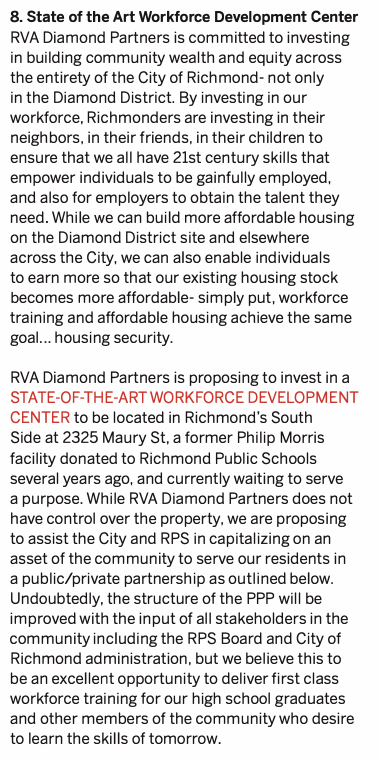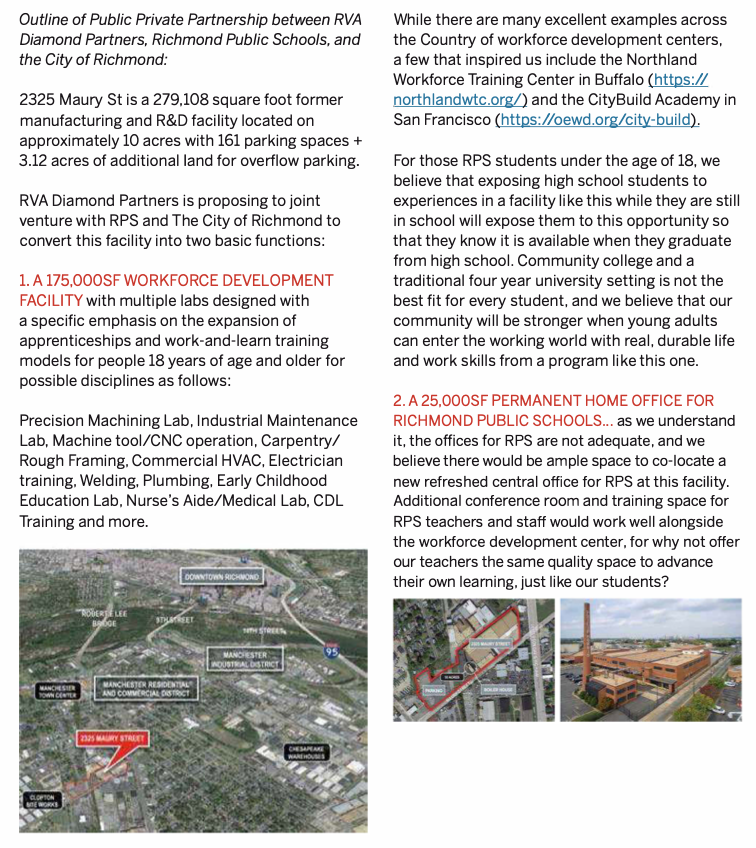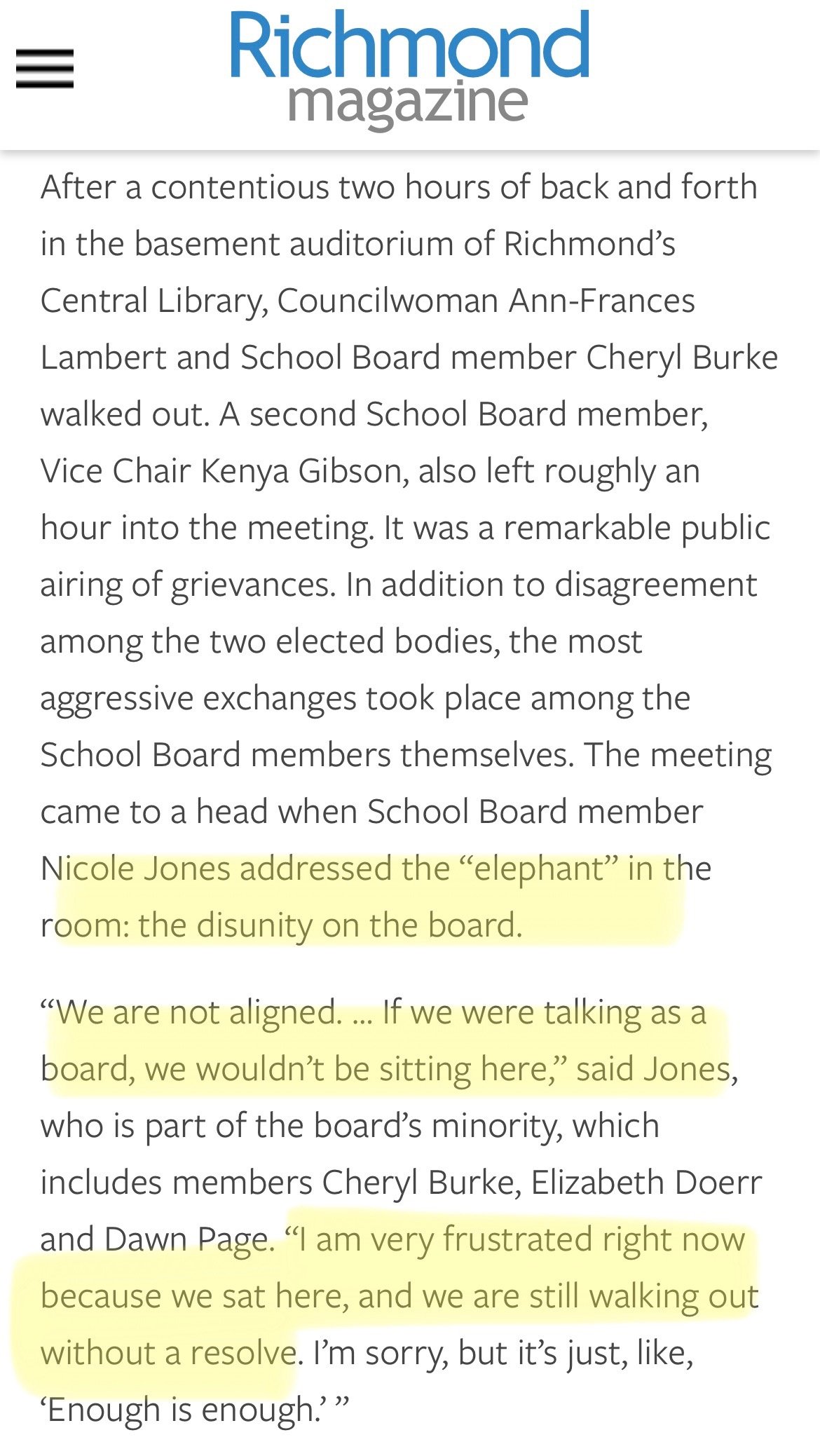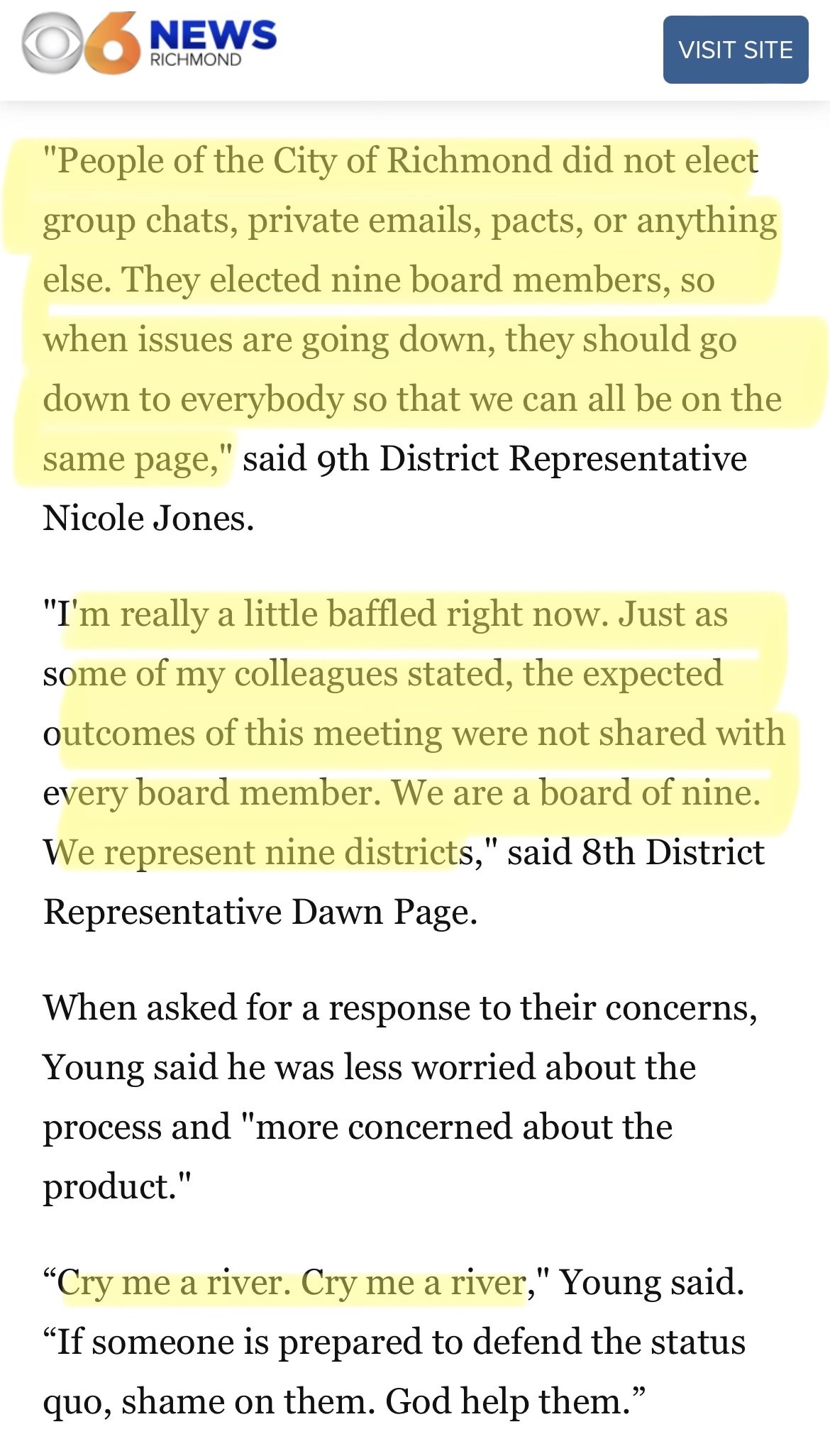RPS RECAP: April 10, 2023
Happy Sunday, Board Watchers! Apologies for the delay in getting this meeting summary out. Turns out my brain needed an extra week of Spring Break. Anyway - I’m back today with the first installment of April’s double-feature. This months’ meetings are back-to-back, so set a reminder to tune into tomorrow’s meeting at 6PM. (Or better yet, come out to TJ and see the Board in action. There was only one public speaker last week, and the audience was almost exclusively RPS staff waiting their turn to present to the Board.)
Here’s what the Board discussed on Monday:
Academic Deja Vu
“What do we want to be when we grow up?”
Pt 1: Career and Technical Education
Pt 2: Early College Academy
Cost & Capacity
Closed Business
Academic Deja Vu
Monday’s discussion began with an update from the Academic Department.
This year, the Virginia Department of Education (VDOE) introduced a new series of math and literacy tests called the Virginia Growth Assessment (VGA). The idea is: students in grades 3-8 take an initial proficiency test in the fall, and a second in the winter to see which subject areas students do - or do not - show growth. Educators can then use these findings to prioritize their instructional time; and Central Office can use this data to prioritize resources like coaches and tutors, or identify parts of the curriculum that need to better align with the SOLs.
Here’s an example from the Fall presentation: “We see 19% correct of questions asked on ‘model fractions and mixed numbers 3.2b’. This tells us this is an area that needs attention over the course of the year. In contrast, on ‘Recall multiplication facts 3.4c’, students are more adept with 45.2% correct already.”
This is a little tricky because students are tested on all the learning standards for their current grade - even though they’ve only been in that grade for a couple of weeks (Fall) or a couple of months (Winter).
Anyway - the results are in from the Winter test (taken in January), and things are looking up! A growth of 10% over the course of the school year would be “quite significant” - and we’re already seeing average school-wide gains of 3% just from October-January. Some schools, like Chimborazo Elementary, report “astronomical growth” of 5% in Math and 7% in Reading. (Pgs 4-8) Since January is a halfway point - we’re told these gains will likely double by the time students take the SOLs at the end of the school year.
Kamras summarizes: “We are seeing growth across subjects, across grade levels, across schools - and that is something to be celebrated.”
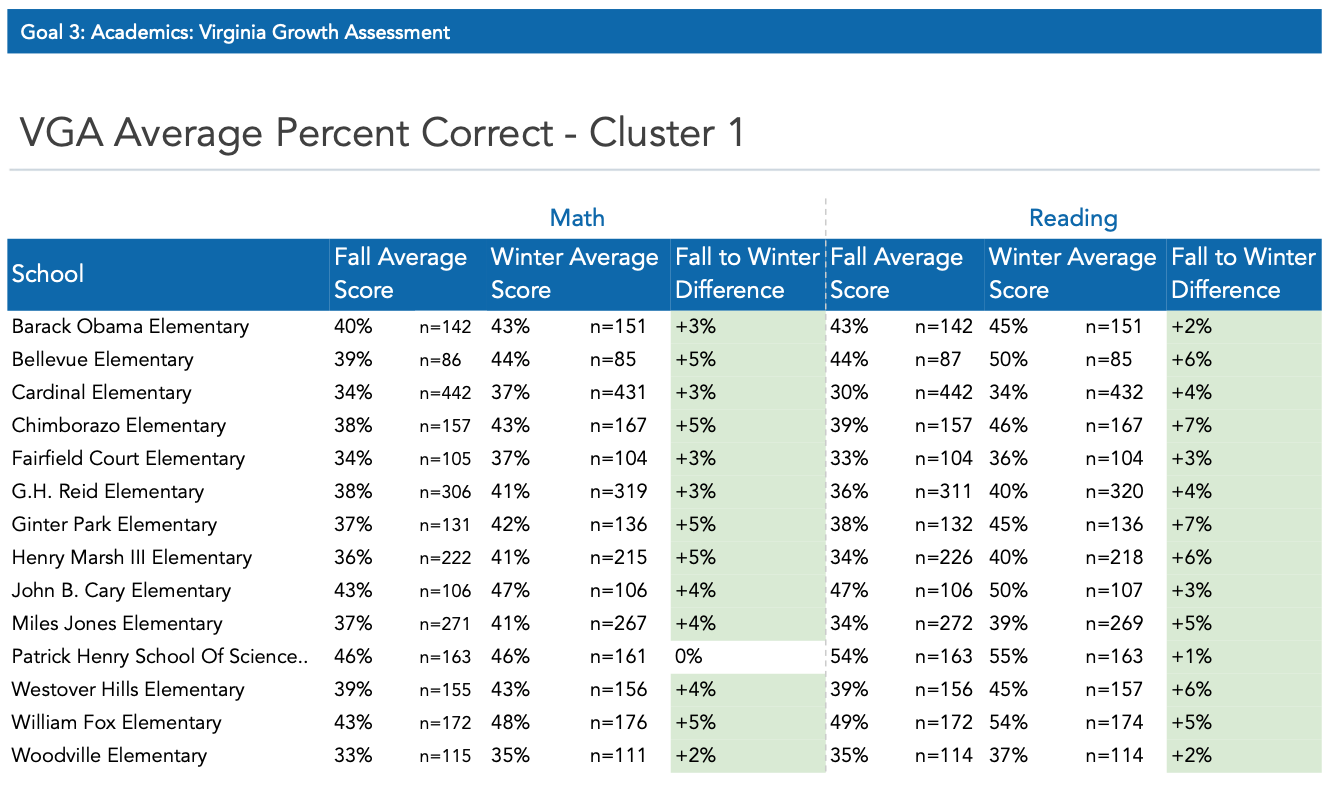
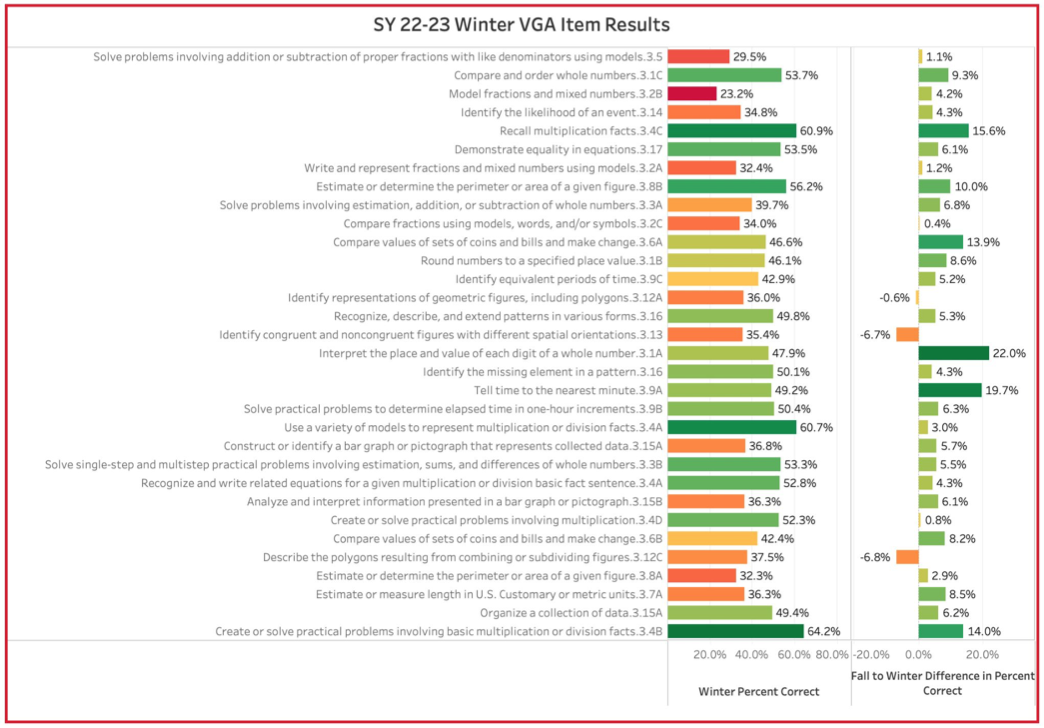
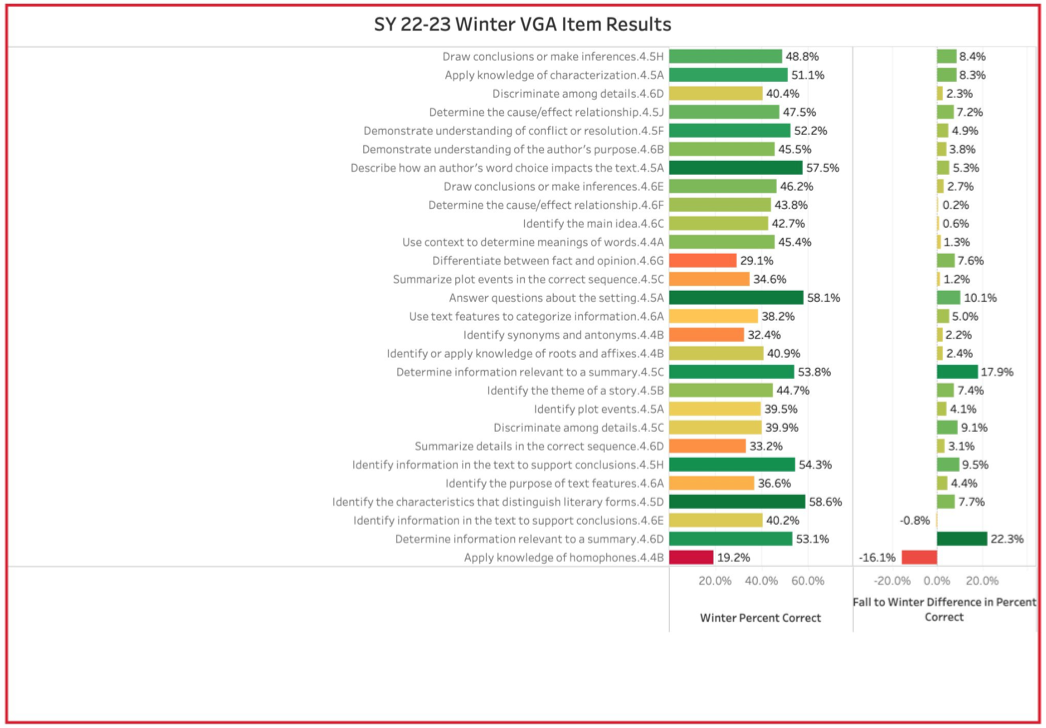
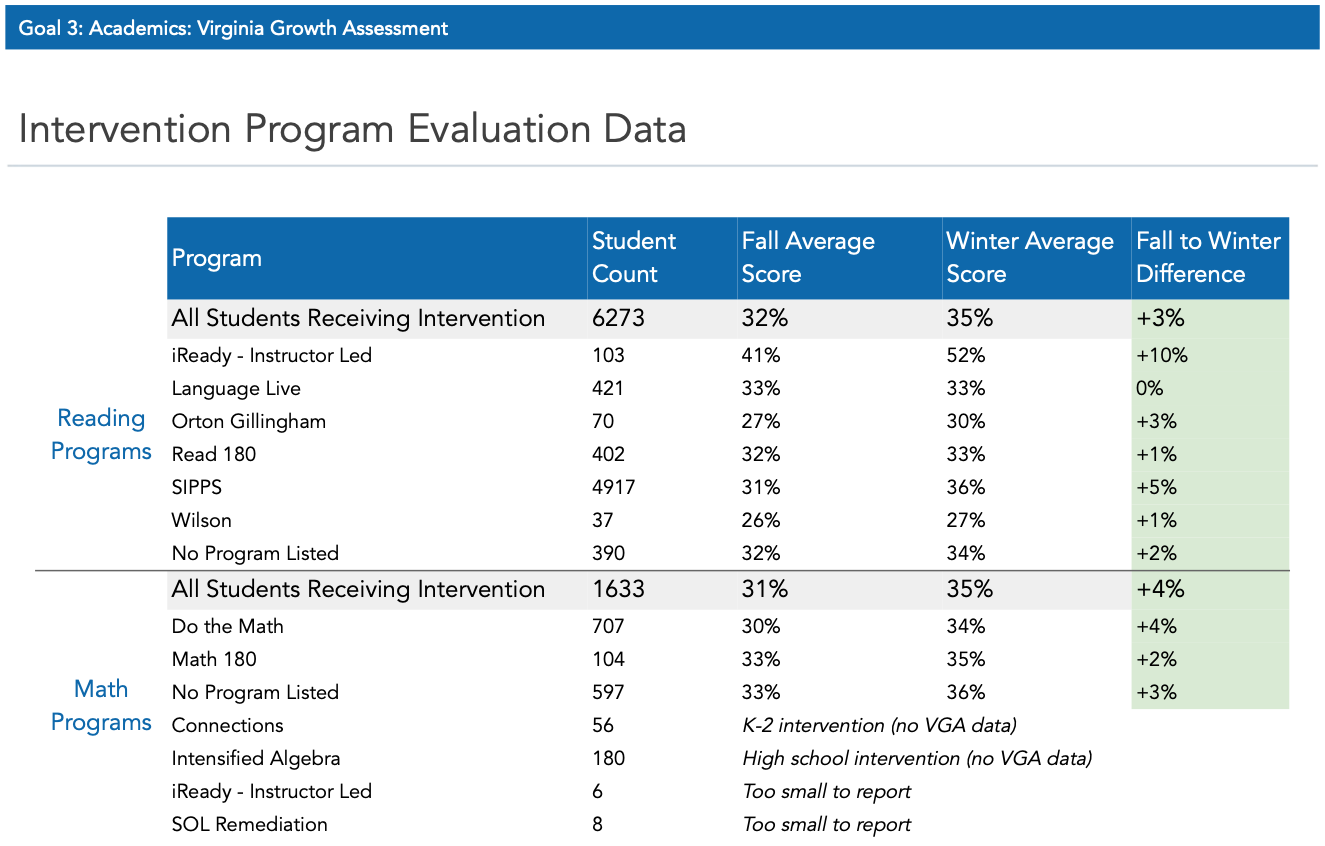
Vice Chair Burke disagrees. She wants to celebrate, but she is “very much concerned” about all the red and yellow in these graphs. “Something here is not clicking, and I want to know what it is.” She wonders aloud if she needs to go back into the schools and be a principal again, because “we can do better.” [Watch] She’s reminded that those yellow and red areas are parts of the curriculum the students haven’t learned yet, but will over the Spring semester. (January is just the halfway point.)
Chairwoman Rizzi worries these results highlight concerns about our curriculum, and how much work it will take to align those lessons to better match the SOLs. Of course - there is no such thing as an SOL-aligned curriculum. Curricula is developed based on national standards, and adapted at the school district level to “align” with their State standards. In RPS, this work is done by “Curriculum Architects” - like this one who defended the current curricula and the work the district has put into customizing it.
Rep White wonders if these tests are predictive of school accreditation. They’re not, school accreditation is a more complicated formula of academic proficiency, academic growth, and student attendance.
Rep Jones asks how the academic team is delegating their limited resources (aka coaches). The presentation gives us a preview:
Number of Coaching Interactions = 2451
Number of Teachers Receiving Support = 505
Total Hours Coaching = 3,300 hrs
Number of 1:1 Coaching Support = 101 Teachers
Dr. Leslie Wiggins, the Chief Academic Officer of Elementary Instruction, elaborates: coaches close “Content Gaps” by hosting monthly meetings at schools, teaching the content to our teachers, and collaborating with educators to ensure they have all the tools they need to be effective. [Watch]
Curriculum talk appears to annoy Rep Young. He describes all the academic team’s work as a “downtown knows best” mentality, and thinks the district would be better off if they just “got the heck out of the way of our teachers.” He’s confident that our teachers always know what’s best for the students (who he calls “customers”). [Watch]
For those keeping track at home - this is the Board’s 3rd generally-positive academic presentation in a row:
The first, in November, showed RPS literacy rates rebounding from the pandemic’s massive blow. Our students outpaced the state average (+7.7% vs 5.6%) - and regressed less over the summer.
The second, last month, showed significant improvements in High School SOL scores (History +7%, Math +16%, Reading +4%).
Each presentation is met with doubt (You’re painting a false picture), suspicion (You’re probably cheating), and an overall demoralizing tone that suggests that the Academic team has no idea what they’re doing:
Do you even track coaches’ effectiveness? Of course. Have you ever heard of spiraling? Yes, and we use this remedial strategy. Do you ignore or withhold resources from accredited schools? Absolutely not.
So, what gives? Why does this keep happening? I have a few ideas:
These presentations are dense and hard to understand. Likely because the data itself is complicated. (The Academic team is full of doctorates for a reason, ya’ll!) Other Boards might fill their gap in understanding with trust. (Tell me what you need! You’re the expert!) Instead, our Board defaults to suspicion in the form of performative finger-wagging. (We used to see this in one or two Board members, but it has spread like a cancer across the dais.)
They’re out of touch. They’re leaning on personal, pre-pandemic experience to guide their decision-making. But the Covid-recovery era has thrown everyone into uncharted territory. Where they should be humbling themselves and opening their eyes and ears to the experts on-the-ground now - they instead cling to some Golden Age of public education that no longer exists. (Rizzi touches on this when she counsels her colleagues: we do not live in a perfect world.)
For example: Young wants to shape division policy around his belief that our “teachers always know what's best for students.” This no doubt endears him to the few veteran teachers we have left - but it totally ignores the current reality in RPS, which is plagued by significant teacher vacancies (76 new teacher positions listed just last week!), and heavily relying on novice/provincially licensed teachers and substitutes to lead classroom instruction. White acknowledges this reality here.
They’re seeing what they want to see. They’re interested in replacing the district’s curriculum. They’re also interested in ousting the superintendent. The Academic team’s presentations highlighting growth undermine both of these goals, proving instead that Kamras, his team, and/or his curricula are successful.
They’re impatient. The growth is there, but it is slow. Much too slow to satisfy the Board’s sense of urgency. These numbers represent real students with real lives ahead of them - and they (understandably) do not want to see those futures limited in any way. Of course, this is beyond the Board’s control. They can fund more coaches or specialists - but they cannot make people apply for those jobs. They can support teachers' curriculum desires - but they cannot make those teachers show up every day or stay through the school year, much less retain them long-term.
I want to be clear here - RPS still has a long way to go. “The numbers are the numbers” - and they include some clear warning signs, too. Those warning signs are clearly addressed and answered in each presentation. More Science supports district-wide. More Coaches at these schools. More time to review theses subjects. Draft more supplements for these parts of the curriculum. These are the things a student-achievement focused Board would be discussing and supporting.
Instead, members of our Board reflexively panic - like they came to the meeting unprepared and are experiencing some kind of sticker-shock. They fixate on the magnitude of the problem, then soothe themselves with their familiar - and favored - solutions. (Burke mentions year-round-school for everyone, Rizzi imagines a curriculum overhaul, Young dreams of a VDOE-less world.)
Maybe these are good ideas. Maybe they’ll end up breaking the very tools that are responsible for the district’s academic growth in the first place.
They don’t know, because they do not ask the experts.
“What do we want to be when we grow up?”
Part 1: Career Readiness
The Board received an update on Career and Technical Education (CTE).
RPS wants to add two new courses to their CTE curriculum: an “unmanned aircraft” (drones) course and an “aviation maintenance” program. This excites Vice-Chair Burke, who mentions the abundance of maintenance jobs at Richmond’s airport.
RPS also wants to renew various existing programs, like culinary arts. Rep White asks admin to confirm: students receive industry-specific certifications for each program. (Yes)
These recommendations are endorsed by the division’s CTE Advisory Council - a group of “local business members, RPS staff, parents, and students” who “advise RPS on local career and technical needs and opportunities.”
Nevertheless, Chairwoman Rizzi shares some concerns about the course offerings. She’s worried that there’s no horticulture program. (It was discontinued years ago because of consistently low student interest/enrollment.) Ditto for construction courses. There are many jobs in these fields now, and she wants Richmond students prepared to fill them. She asks the administration to report back on where CTE students find employment after completing these programs.
Also on CTE: the Board addresses the Altria-Elphant in the room. This warehouse - gifted to RPS *six* years ago - has sat idly, waiting for the city to allocate the funds necessary to turn it into a new trade school.
The good news is - that CIP money is coming in a whopping $200M installment on July 1!
The bad news is - the Board effed-around in 2021 when they same-night-motioned their way into sole-ownership of the school construction process. Now they’re finding out that doing so - without a construction team in place to do the work, much less room in the budget to hire one - has created a years-long delay in breaking ground on Wythe, and now the runaway costs of materials and labor aren’t going to leave much money left for the Altria project.
The City tried to bail them out again back in the Fall. They awarded the Diamond District project to a development team under the condition that they make a “good faith” effort to help expedite the Altria project.
The developers reached out to the Board in the Fall, offering to buy the property, renovate it, and lease it back to RPS as a trade school. Then-Chairwoman Harris-Muhammed never brought this offer to the Board. (It sounds like she didn’t even respond to their email.)
Rep Young is eager to get this project back on track. He asks his colleagues to entertain this public-private partnership (PPP).
Tom Wolf, the Board’s pro-bono lawyer in the Arthur Ashe dispute, also advises the Board to meet with the developers.
The current Chairwoman sounds open to the idea. She offers to reach back out to the developers and set up the meeting.
Rep White is agreeable, too. She hopes the developers will bring an update on their possible Arthur Ashe litigation. (They will not, because Thalimer has nothing to do with the City’s legal department.)
Part 2: College Prep
The Board later discusses college-bound students who are earning college credits as 11th and 12th graders. Currently, 63 RPS students participate in this Dual Enrollment program, called the Early College Academy (ECA), and 147 students have applied to participate next year.
Rep White is concerned that the number of participants is roughly half of the number of applicants. She worries that means we have a significant number of students who are accepted to the program, and then drop out. “How can we maintain our students - keeping them there? Looking at this data, it’s just not measuring out.”
Kamras clarifies: J Sargeant Reynolds does not accept every student who applies. RPS uses every ECA seat they pay for, and the Board will need to amend the budget if they want to add more.
Chairwoman Rizzi piggy-backs here. “I do know that there is some attrition.”
Vice Chair Burke does, also. “Armstrong had 5x’s that amount - more than 2 students.”
Additionally:
They want the selected students to represent Richmond’s diverse student population.
They want to prepare students in/before Middle School to be qualified applicants, and to be successful in these rigorous programs.
They want a fair and equitable application process. Throw out the written essay and teacher recommendation requirements. Select students via a lottery system so long as they meet a minimum (“floor”) GPA threshold.
*RECORD SCRATCH*
No, wait - that was the consensus in last month’s Specialty Schools discussion. The district already selects ECA participants with a Floor GPA + lottery system. Now they've changed that, opting to rank and select candidates by their qualifications instead. Nobody objects to the essays or required teacher recommendations.
Vice Chair Burke is relieved, because she knows of straight-A students who were rejected last year, while lesser-qualified students were chosen instead. [Watch]
Don’t get me wrong: this is not a “gotcha” moment. The Board represents a wide array of perspectives. There’s absolutely nothing wrong with them holding opposing interests.
What this moment does illustrate, though, is why this governing team (Board+Supt) struggles to make even basic decisions.
It’s like they’re trying to order a single pizza for the table (school district) - but they’re all demanding their confused server (Supt) include different pizza toppings (priorities). Sometimes he can make it work - cheese on this side, pepperoni on the other - but other times their instructions are completely contradictory. I know my friends here are vegan and lactose intolerant, but bring us that pepperoni pizza with extra cheese anyway. He cannot make everyone happy. And really, he’s not supposed to.
Consensus and compromise are the Board’s job. Not his. Board leadership is supposed to take all the notes, determine the will of the majority of the Board, and order one pizza (vote).
The Superintendent is just the chef: there to confirm that he has the necessary ingredients before disappearing into the kitchen to make it happen.
This is how the system is designed to work. This is how it would work if the Board followed their “blueprint” (aka governing rules), attended their governing conferences, and took their role as decision-makers seriously.
The only reason Richmond has this bizarre-o governing remix is because - by their own admission - they are too divided. They do not talk. They do not work together. They have personal drama. Pride and prejudice. So they often cut those colleagues out of policy-making, working with allies behind the scenes before springing consequential same-night motions in the next Board Meeting. They minimize and dismiss all objections, saying “cry me a river.”
Or, they show up as a lone-wolf vigilante, lecturing the superintendent about all the ways he’s disrespecting social workers, teachers, or whichever RPS staff bent their ear this week. They give some rousing speech, make a surprise motion, and hold it high in the air like a frothy beer mug while they ask their colleagues - “who is with me!?” [Watch this 2-minute example.]
The yes-votes they get are not the result of well thought out policy-making. They are just hearts on a twitter post from their peers on the dais who also have a bone to pick with the superintendent, or other offending individuals on his staff. (Mixing all the metaphors, here.) They go home feeling really good about themselves, and whatever impact they think their vote will make.
All this to say… I don’t know which specialty school or ECA selection method will win out. They want to award seats based on equity (lottery). They also want to award seats based on merit (qualifications). Both are on the menu. What the table decides to order will come down to how strong our Chairwoman’s leadership is, and whether or not any of her Board colleagues go rogue. I’ll keep you posted!
Cost & Capacity
The Board got a non-update on the State Budget. The General Assembly is still in limbo, and recent headlines warn that legislators may not finalize a budget until June.
This is incredibly stressful news for RPS. If state legislators do not pass an amended budget, the district will need to make $10M in cuts.
The Superintendent is duty-bound to recommend those cuts, but he regrets that it will cause panic and hurt morale among RPS employees. (He’d prefer the General Assembly pass the Senate’s budget, instead. This would increase RPS’ funding by $17M. He begs the (sparse) audience to contact their lawmakers.)
Doerr recommends some cuts: lose the Virtual Academy, the auditor position, and the $100K teacher retention fund. (A cheeky Young has a “long list of cuts” too, but does not make those recommendations public.)
Kamras: will do his best to bring something high level. Doerr: would love to have recurring meetings re: fed stimulus cliff that will drop off next year. Cuts are unpopular she recommends RVA, central office audit, teacher retention initiatives, school leader 360 eval
— RVADirt (@RVAdirt) April 11, 2023
Gibson doesn’t like all this uncertainty. She urges the superintendent to get a better idea of the State’s final budget. She also says his list of recommended cuts will motivate her friends in the advocacy community, who plan to petition City Council for more RPS funding.
The sudden pivot from “please advocate to the state” to “we’re gonna advocate to the city instead” caught me off guard. Especially since the Governor is boasting how there’s “plenty of money” in Virginia, and the Mayor has already stretched the city’s finances to increase their RPS funding by $21M this year. [Watch]
Either way, cuts are coming for the Board’s “swing for the fences” budget. Also on the chopping block: Student Wellness, English Learner, and Athletics investments. Sigh.
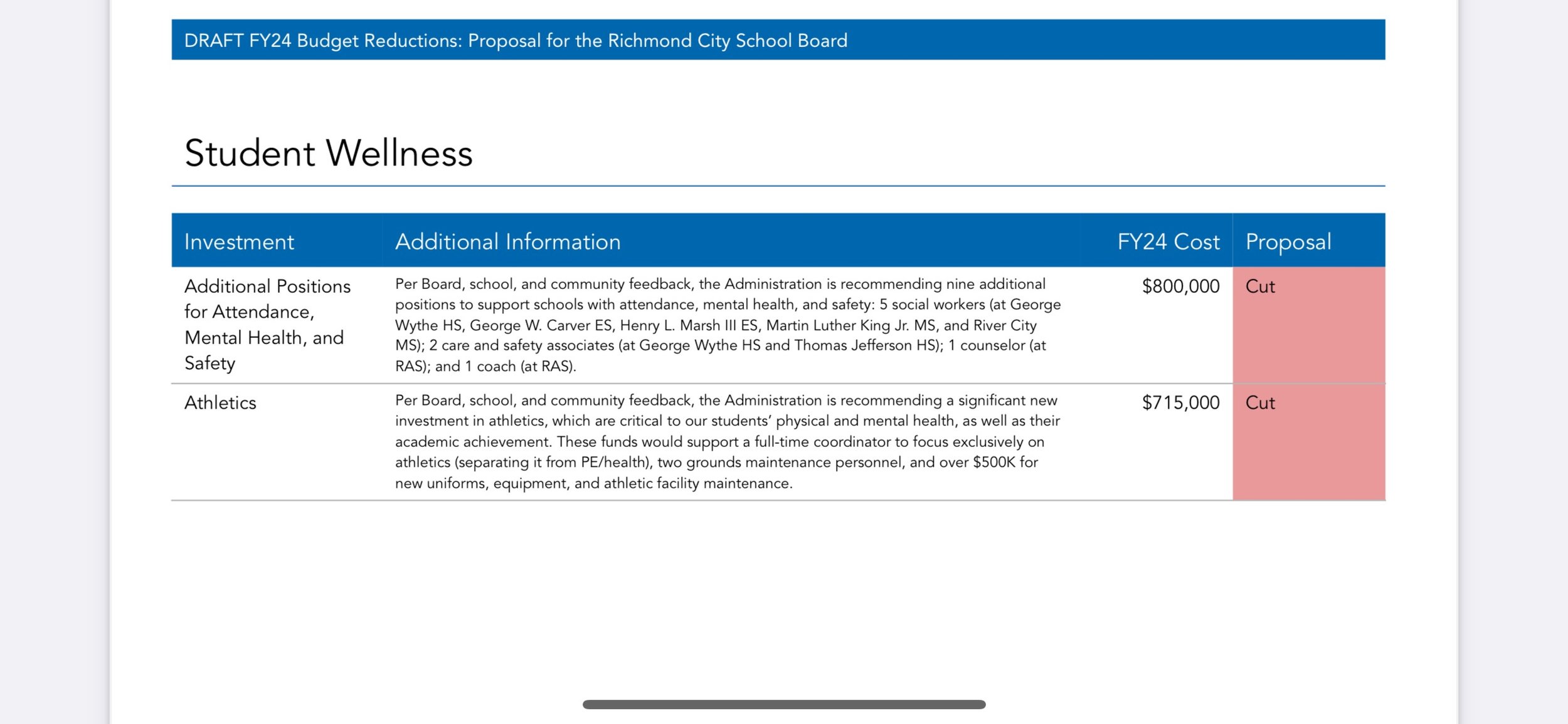
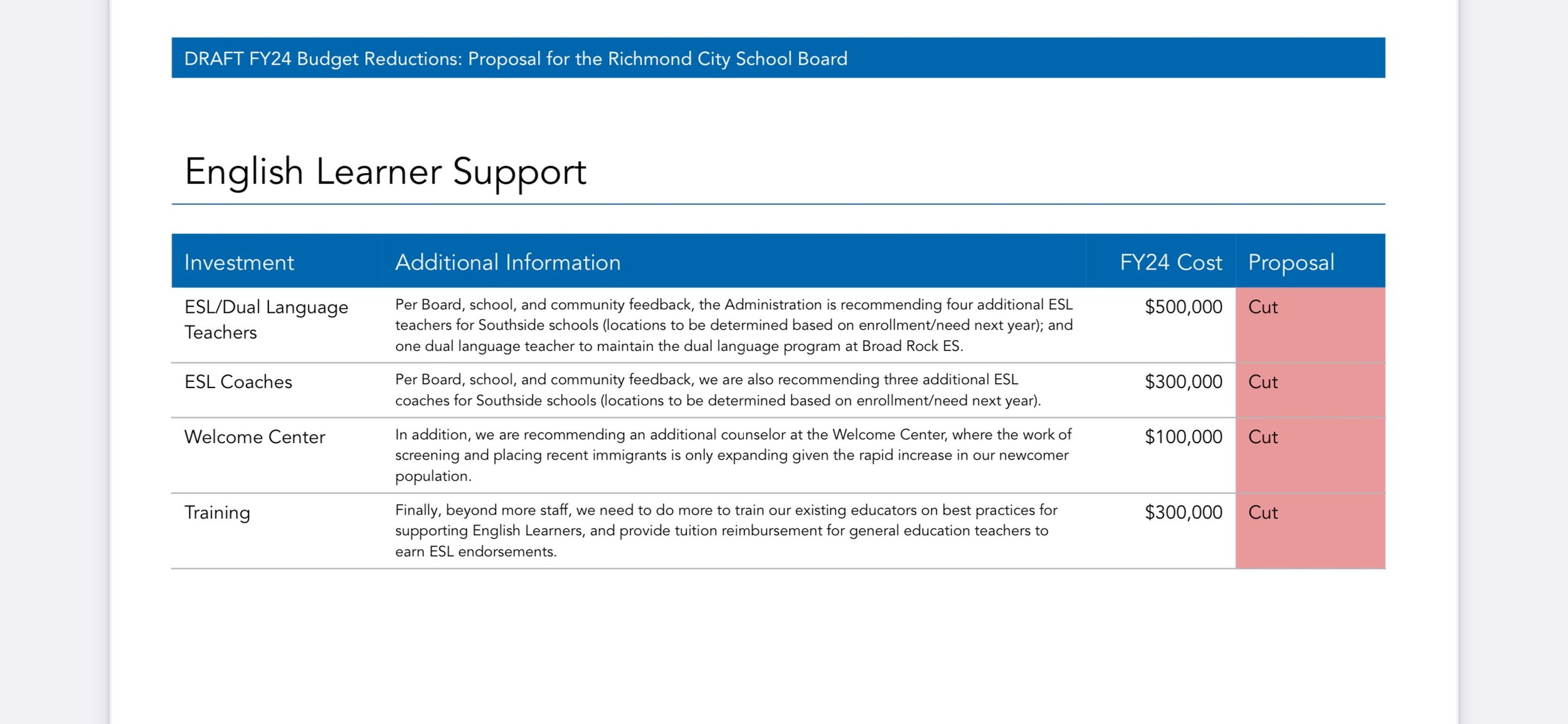
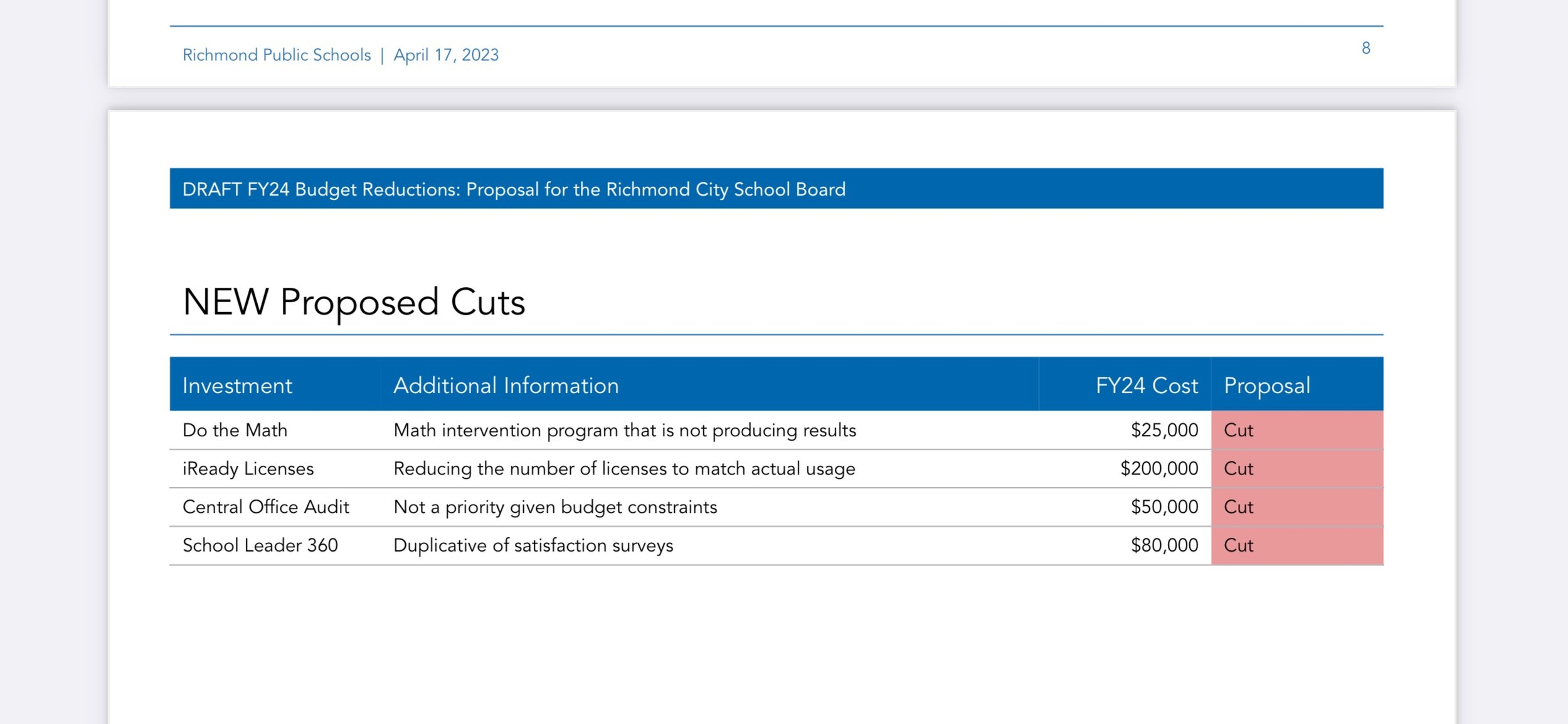
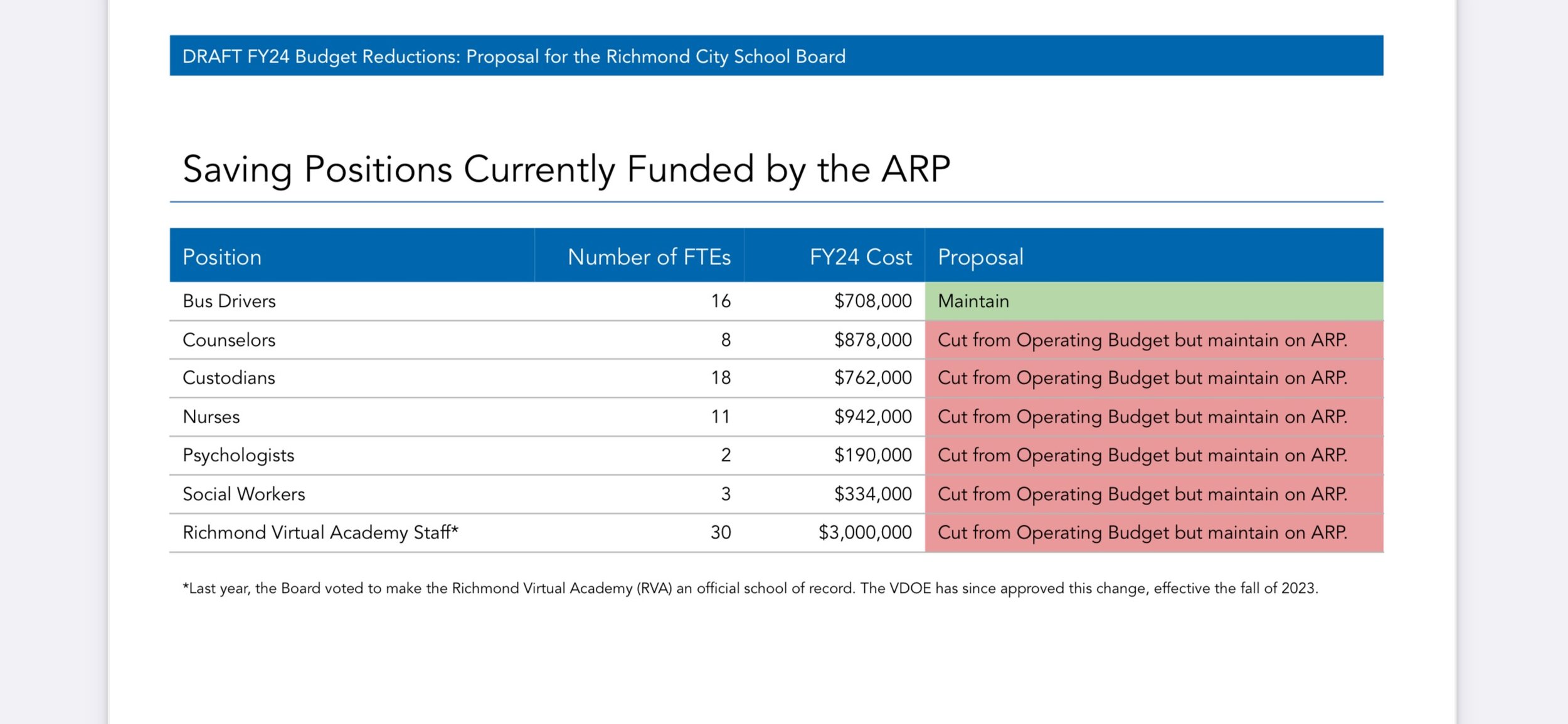
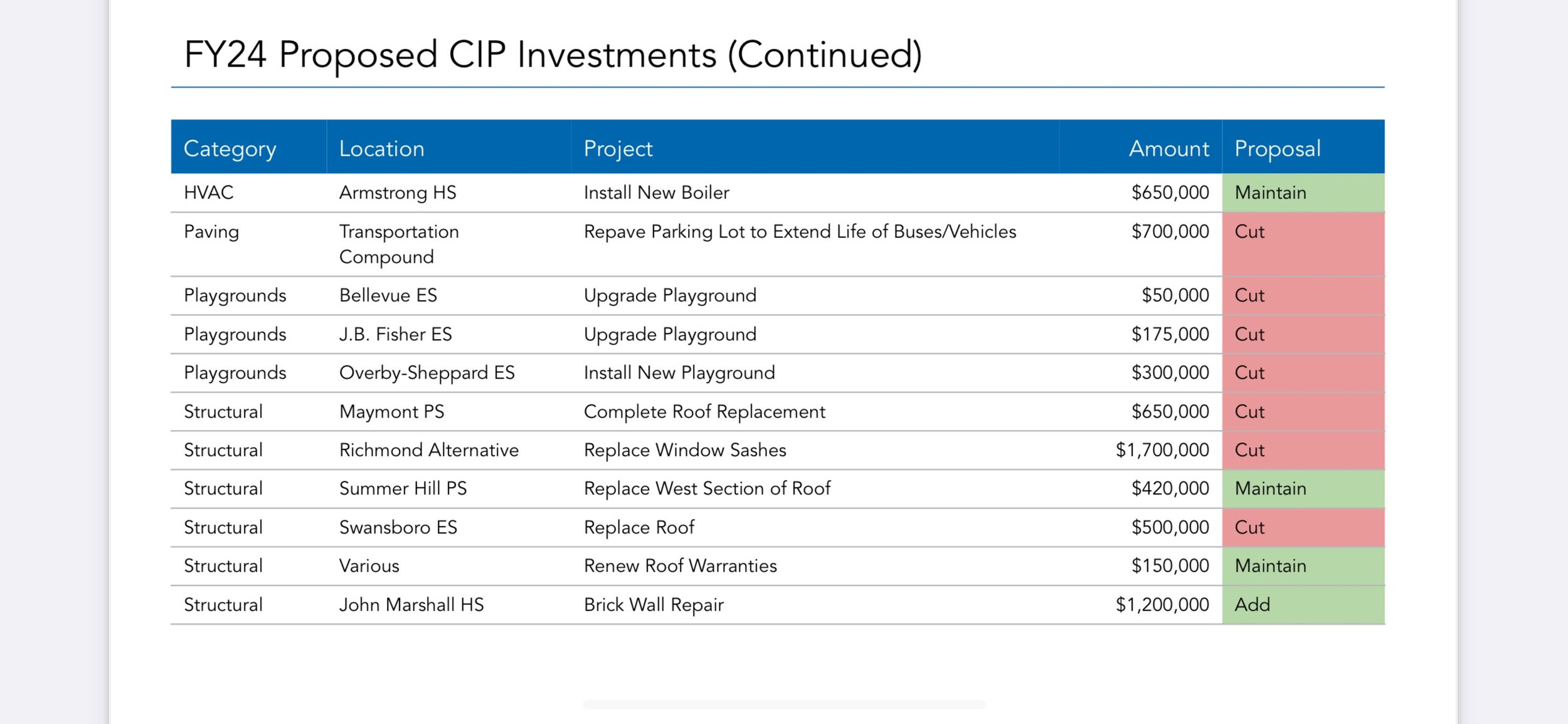
So far everyone (the Board, the administration, and the Mayor) all support using limited funds to prioritize funding Collective Bargaining Agreement. The Mayor’s +$21M comes just short of the CBA’s $24M price tag.
Side note: There’s some CBA drama brewing. Gibson suspects the administration is changing the terms of the agreement without input from the teacher’s union. The Board lawyer says, actually, she’s the one “changing” the CBA language. She is translating it into contract-ready “legal-ese.” There has since been talk in REA circles that some things have been lost-in-translation, so I expect we’ll hear more about that in public comment on Monday.
Closed Business
The Board went into closed session on Monday night to discuss an employee matter. (We know this per White’s request during Personnel Actions, and the specific Closed Session language that Young read into the record.)
Rep Shonda Harris-Muhammed, who skipped the rest of the Board Meeting, showed up just in time to participate in this private discussion.
Apparently - this did NOT go well.
Here’s what I heard through the grapevine:
The administration proposed the firing of an employee. Multiple character witnesses supported this decision. Harris-Muhammed did not. Sometime after midnight, after several members had left, the Board voted to overturn the administration’s recommendation. (This is sort of their thing.)
I don’t know what Harris-Muhammed’s case was. Maybe it was very compelling. Maybe she just wore her colleagues down until enough of them left or gave in. I cannot and will not know, because personnel matters are confidential.
In any case, the employee was reinstated, which highlights the two contradicting tracks of “justice” for RPS employees:
The Board will ‘trust school staff when they report toxic employees’ - so long as the Board dislikes the employee in question (Ex: Dr. Hurt at Holton). Otherwise,
The Board will disregard staff testimony altogether, and misuse their elected authority to protect the accused - so long as they’re the Board’s friends, sources, or sorority sisters.
That’s all for this week. Catch you at tomorrow’s Board Meeting, or later in the week with the next recap. Cheers!



